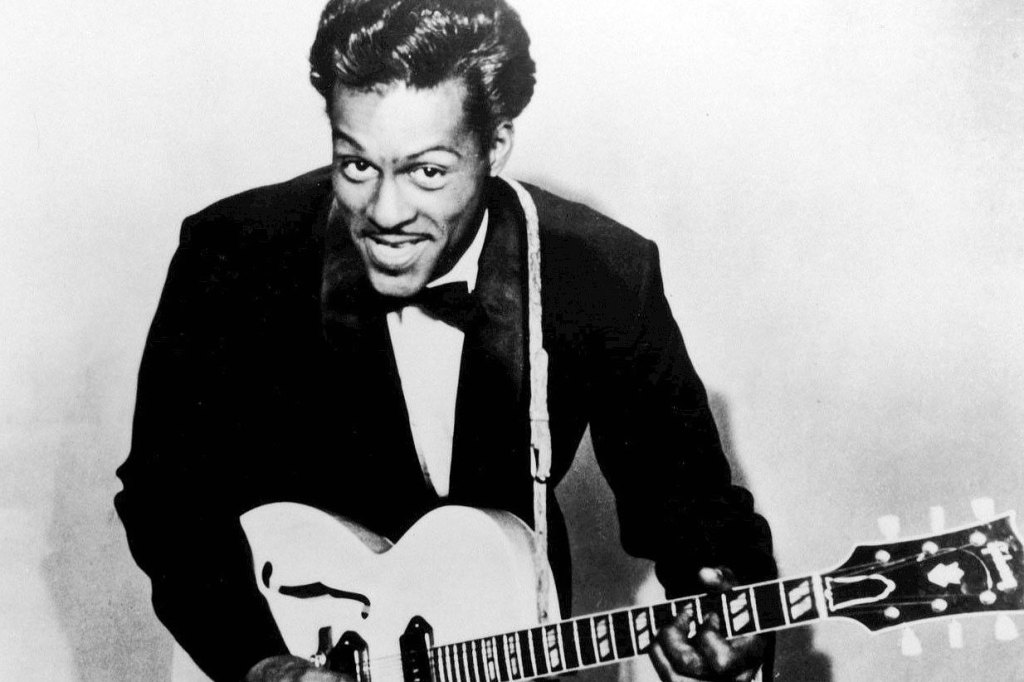Remembering Chuck Berry, ‘rock ‘n’ roll’s first poet’

Chuck Berry, the legendary rock ‘n’ roll pioneer, died on Saturday at the age of 90. But his legacy will continue to live on in the future songs of tomorrow’s stars, said Junauro Landgrebe, a Northeastern lecturer in the Department of Music who teaches the Music Theory for Music Industry and Rock Music courses, as well as directs three performance ensembles at the university.
Berry, who was born in St. Louis, rose to fame in the mid-1950s with songs that broke sonic ground and lyrics that “focused on teenage interests and lifestyles,” he said. Indeed, traces of Berry’s pioneering style can be heard in the work of musicians such as Buddy Holly, the Beatles, Jimi Hendrix, and Bruce Springsteen.
Here, Landgrebe reflects on Berry’s lasting impact on rock ‘n’ roll.
What is Chuck Berry’s legacy?
Berry was the architect of the musical language that became known as rock ‘n’ roll. Furthermore, he was the first to bring the electric guitar—rock music’s signature instrument—into the forefront of the style with his energetic solos and assertive style. He was a music innovator who fused elements of previous styles like blues, rhythm and blues, and country into a new style that appealed to teenagers. This appeal was in large part due to the clever lyrics of his songs that focused on teenage interests and lifestyles. He was rock ‘n’ roll’s first poet.
How did he change the musical landscape?
Berry wrote and recorded his own songs during a time when the majority of artists recorded songs written by professional songwriters. For example, Elvis Presley, the “king of rock ‘n’ roll,” did not write his own songs; instead, songwriters like Jerry Lieber and Mike Stoller wrote hits like “Hound Dog” and “Jailhouse Rock.” Berry represented a significant break from the tightly controlled songwriting practices of the times and inspired future artists to take more control of their creative works.
Are there any artists who owe any of their sound or success to Berry?
Berry had an immediate impact on artists from the mid 1950s—like Buddy Holly—and into future decades with artists like the Beach Boys, the Beatles, the Rolling Stones, Jimi Hendrix, The Clash, Alice Cooper, and Bruce Springsteen, to name a few.
Buddy Holly’s “That’ll Be The Day” used the same structural technique found in Berry’s “Rock and Roll Music,” which puts the chorus before the verse. The Beach Boys’ Brian Wilson used the music to Berry’s “Sweet Little Sixteen” as the framework for the band’s first top-10 hit, “Surfin’ U.S.A.” Berry was later given songwriting credit along with Brian Wilson for the songs’ similarities. The Beatles covered a number of Berry’s songs during their formative years performing gigs in Liverpool, England, and Hamburg, Germany. One of the Rolling Stones’ first successful recordings was a cover of Berry’s “Come On.” Cooper used Berry’s lyrics as the standard of excellence he strived to reach for his own songs. And Springsteen’s guitar style is indebted in many ways to Berry’s guitar style.
How did Berry influence you as a musician?
Berry’s guitar style has influenced almost all guitarists who play rock music, including me. As a professional guitarist and guitar teacher, I play a lot of music from the past and present. Berry’s use of power chords is evident in most guitar-driven music to this day. I still teach my guitar students his signature guitar riffs and power chord rhythm and blues patterns as the basis of learning how to play rock guitar.
Photo via Flickr





